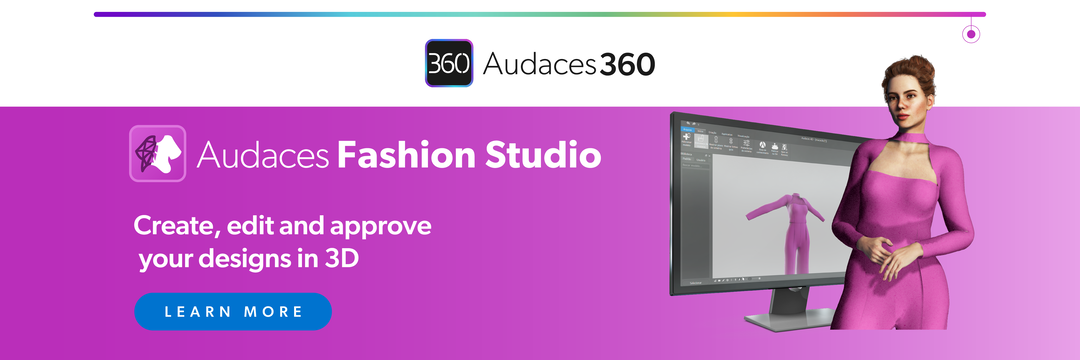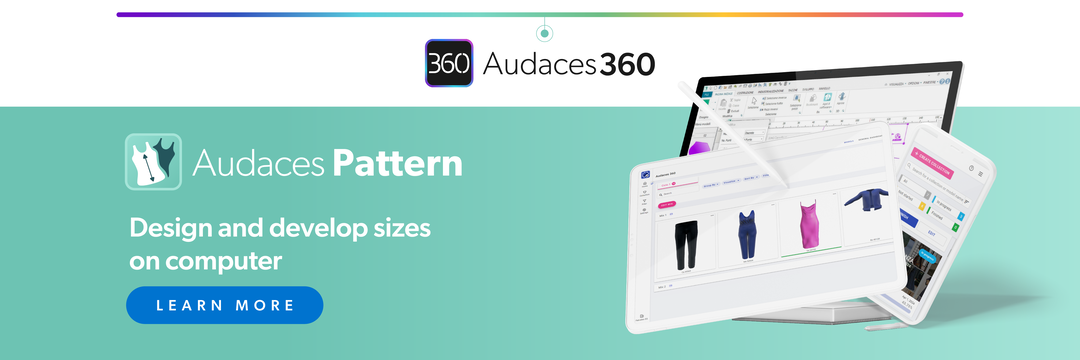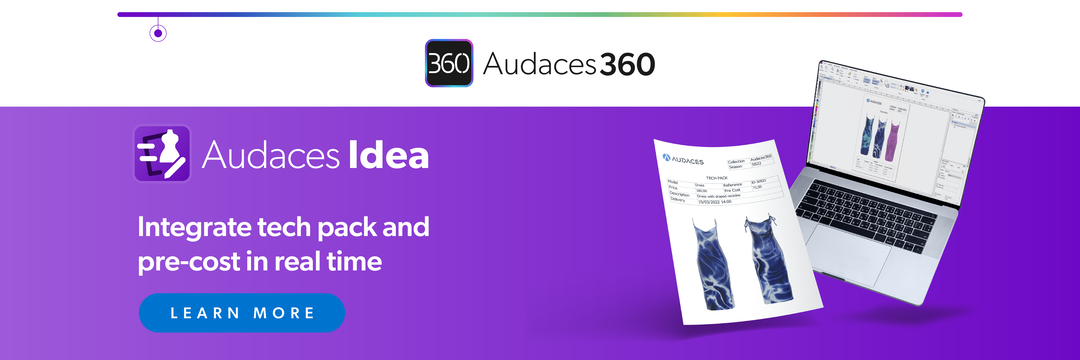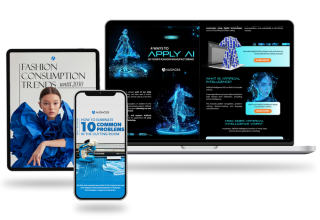Summary
- Designing a dress involves various approaches, but certain steps can simplify the process.
- Familiarizing yourself with techniques on how to draw a dress online can enhance your daily creative endeavors.
- Explore the world of dress design with Audaces tools! Take advantage of the Audaces360 multi-solution free trial.
For those interested in learning how to draw a dress, it’s essential to consider the diverse elements that contribute to crafting garments suitable for different occasions.
Formal events, such as weddings, demand a touch of sophistication. Long dresses, crafted from refined fabrics like silk or lace, exude elegance and grace.
Attentive styling is crucial to achieving a distinctive look. Informal gatherings, on the other hand, call for an aura of lightness and relaxation.
Comfortable fabrics and varied lengths seamlessly align with the relaxed atmosphere of such events.
Sumário
Transforming these design concepts into reality requires a methodical, step-by-step approach.
To assist you in this creative journey, we’ve crafted a comprehensive guide to help you develop your dress from inception to completion!
Happy reading!
Factors to consider when learning how to draw a dress for various occasions
When mastering the art of drawing dresses for diverse occasions, several considerations can elevate your design game, encompassing style, fabric, and length tailored to the specific event.
For formal affairs like weddings, opt for elegant designs such as long dresses and refined fabrics like silk or lace. Pay meticulous attention to styling to achieve a sophisticated and polished look.
In more laid-back settings, like casual meetings, lean towards lighter and more relaxed dress options. Choose comfortable fabrics and experiment with varying lengths to complement the event’s ambiance.
Consider the season when selecting materials. Light fabrics and vibrant colors are ideal for summer, while autumn and winter may call for richer materials like wool or velvet in darker tones.
Functionality is also crucial; for active events like dance parties, choose dress models that facilitate movement. In formal situations such as business meetings, opt for dresses that exude professionalism.
Versatility is key, with neutral colors like black and white serving well for various occasions.
Experiment with bright tones and prints for more relaxed events, ensuring to strike the right balance and avoid excessive patterns for formal occasions.
Tailor the design to accentuate the female body, emphasizing positive features while providing comfort.
This not only results in a visually appealing dress but also one that instills confidence and ease in the wearer.
Learn more: How to create technical drawings online for fashion manufacturing

What are the most effective techniques for drawing dresses?
To excel in the art of designing dresses effectively, employ the following methods:
Begin by drawing inspiration from current fashion trends. Explore magazines, websites, and social media platforms to grasp what’s currently in vogue.
Then, translate your inspiration into action by creating simple sketches. This initial step allows you to swiftly capture your ideas on paper, providing a visual foundation before delving into intricate details.
Don’t forget to gain a thorough understanding of human body proportions. This knowledge ensures that your dress design not only complements the figure but also prioritizes comfort.
Also, try to incorporate various fabrics into your designs to comprehend their draping and behavioral characteristics. This experimentation aids in selecting the ideal material that aligns with your envisioned style.
And super important: infuse creativity into your designs by exploring embroidery, lace, or accessories. These elements add a unique touch, setting your dresses apart. Experiment with different embellishments to find the perfect balance.
Finally, vary the cuts and lengths of your dresses to cater to different tastes and occasions. This adaptability ensures that your designs are versatile and suitable for a wide range of preferences.
By incorporating these techniques into your approach on how to draw a dress, you can enhance your design skills and create garments that stand out in the world of fashion.
Learn more: 7 steps to develop your fashion collection planning
Step-by-step instructions on how to draw a dress
Well, it’s time to learn how to draw a dress effectively now by following these step-by-step guidelines to streamline your creative journey.
Rely on good tools
Start your dress design with the right tools. Utilize sophisticated software, such as Fashion Studio, to simplify the drawing process and enhance the detailing in your designs.
Study the dress anatomy
Before putting pen to paper, delve into the anatomy of the dress. Understanding how fabric conforms to the body is crucial for creating realistic and visually appealing designs.
Focus on proportions and details
Ensure each part of your dress is well-balanced. Add intricate details like textures, and observe how the fabric drapes to infuse dynamism into your design.
Pay attention to the finishes
Pay meticulous attention to finishes to ensure your dress appears well-crafted. Details such as seams and embroidery can make a significant difference in the final look of your design.
Customize colors and prints
Inject your personality into the dress by selecting colors and prints that resonate with your style or design concept. This personalized touch adds a unique dimension to your creative endeavor.
Learn more: How to create a clothing color chart to elevate your collection
Transfer your drawing to the technical sheet
Transition your drawing to the spec sheet or tech pack. This involves providing comprehensive details about the design, fabrics, and dimensions, ensuring precise understanding and accurate replication of your vision.
Learn more: Uncover 5 expert tips on how to create a tech pack successfully
What are the advantages of drawing dresses with online tools?
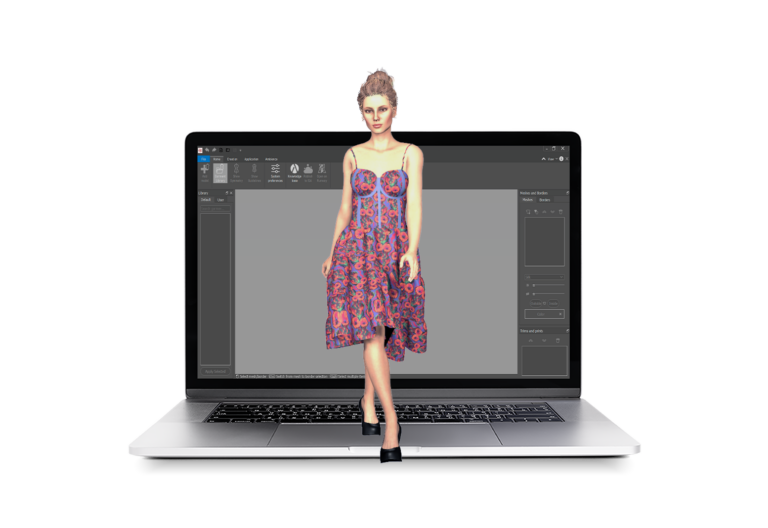
Designing dresses using online tools presents numerous advantages, offering a more flexible and efficient experience for fashion designers.
Explore some benefits next!
Freedom of creation
Online tools provide designers with complete freedom to explore their creativity. The digital interface offers a wide range of options and features, enabling unlimited experimentation in crafting unique and innovative designs.
Learn more: How to create a moodboard and organize your fashion inspirations?
Reduced waste
The shift to digital media significantly diminishes material waste. By designing online, the need for paper, pencils, and erasers is eliminated, contributing to more sustainable and eco-friendly practices within the fashion industry.
Learn more: How to properly dispose of your clothing company’s textile waste?
Enhanced precision in details
Digital tools offer an unparalleled level of precision. Designers can expand their designs, adjust minute details, and ensure that each element of the dress is meticulously crafted, resulting in more refined and visually impactful creations.
Ease of team contribution
Collaboration becomes seamless with online drawings. Teams can instantly share and review projects, facilitating the exchange of ideas and collective contribution. This promotes a more integrated and effective approach to the creative process.
Explore 100% digital dress creation with Audaces Fashion Studio
Transform your dress design experience with Audaces Fashion Studio, a platform enabling the entirely digital creation of unique pieces.
With this innovative tool, you’ll unlock several advantages that enhance every stage of the creative process.
Audaces Fashion Studio features a fabric drape simulation within a virtual and digital environment, offering a realistic visualization of the final result. Precise application of colors, prints, and textures lends authenticity to your creations.
Noteworthy is the reduction in prototype iterations during the creation phase, expediting project development.
Moreover, Audaces Fashion Studio significantly contributes to cost reduction throughout the creative process, making it more accessible and sustainable. The clear, realistic view of models on the computer screen allows for precise adjustments before production.
Now that you’re equipped with the tactics on how to draw a dress digitally, consider putting them into practice.
Download our free e-book to learn how and why to leverage 3D virtual design for fashion:
FAQ
When creating dresses for various occasions, it is crucial to consider the style, fabric, and length based on the specific event.
Make simple sketches to translate your ideas onto paper and visualize the design before delving into details. Also, be attentive to the body, ensuring that the dress not only flatters the figure but also prioritizes comfort.
Start your design with reliable tools like digital software or sketching materials; familiarize yourself with dress anatomy for a realistic design; and ensure a balanced design with a focus on proportions and details.


